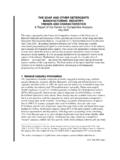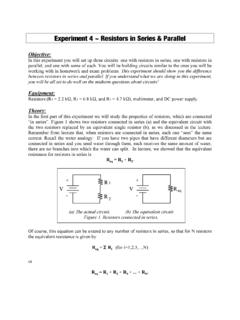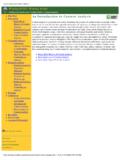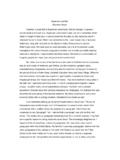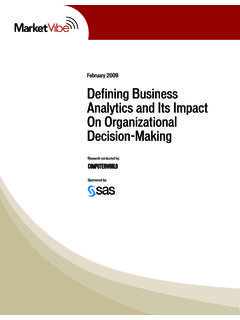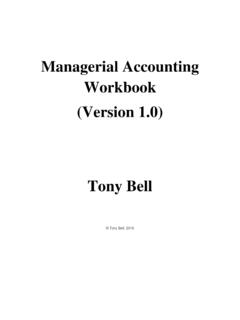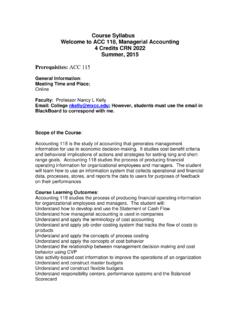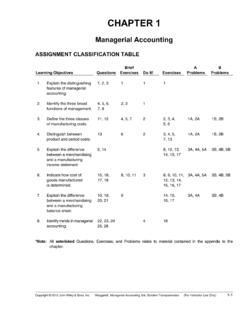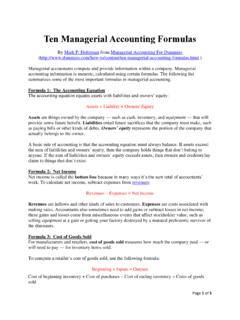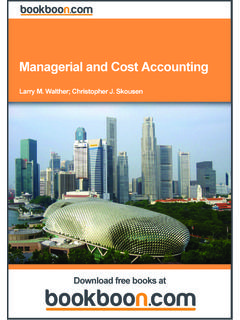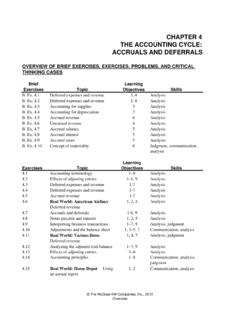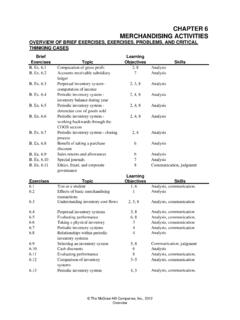Transcription of Financial)and)Managerial)Accounting)
1 Syllabus: ACCTNG5400, Spring 2015 financial and managerial accounting Page 1 of 13 Instructor: Jennifer Reynolds- Moehrle, Phd, CPA Phone number:314- 516- 6764 Email address: Campus office: 1212 SSB Tower Virtual Office Hours: Wednesday 8:00- 9:35 pm through Blackboard IM In- Person Office Hours: Tuesday 4:00 5:15 PM and by appt. Welcome to financial and managerial accounting . This course will be an introduction to key financial and managerial accounting concepts. We will examine the economic environment of accounting as well as the mechanics and measurement issues in accounting . The primary goal of the financial accounting portion of the course is to understand how financial statement disclosures are developed, determine whether the disclosures reflect the economics of the transactions, and discuss how the disclosures can be used to make optimal decisions.
2 The primary goal of the managerial accounting portion of the course is to understand what information is available to managers and how this information can be used to make optimal decisions. Instructor Bio I am looking forward to learning more about you throughout the course. I came to UMSL from the University of Southern California in 1999. I am originally from western Kentucky and my husband (also an accounting Professor here at UMSL) is from St. Louis so the decision to move from LA to St. Louis was an easy one! I have an undergraduate degree from University of Kentucky along with a PhD from Indiana University and I spent several years working in Public accounting and in private industry before I started the PhD program.
3 As an associate professor my time is split between teaching, research, and service. My teaching is evenly divided between upper level undergraduate accounting courses and graduate courses. Most of my research is in the areas of financial reporting and accounting history. I am involved in a variety of COBA, campus, and university administrative activities such as planning for our new COBA building, providing input into campus building and physical facilities issues, and helping to mentor faculty who are new to UMSL. Teaching Philosophy Success in teaching depends upon success in learning. I strive for successful teaching by maximizing the potential for successful learning, which I believe can best occur if the following attributes are present in the course: a readiness to learn, an understanding of the relevance of the material, and an opportunity to risk being wrong.
4 A successful teacher stretches the student s expectations about the subject to the point where the student develops the desire to be prepared so as not to miss out on what s coming next. I stretch student expectations by mapping the Syllabus: ACCTNG5400, Spring 2015 financial and managerial accounting Page 2 of 13 course material into the context of your world. As an investor, you will become comfortable with the information provided by companies you may consider investing in and as an employee you will become more aware of how owners and other investors use the information provided by your employer. Success in learning is only possible when the student recognizes the relevance of the subject for herself.
5 A successful teacher makes clear the relevance of today's material for tomorrow's learning. I incorporate relevance into my teaching by using many in- class examples from the real world. We will use cases that will require you to evaluate the quality of accounting information and to use that information to evaluate decisions made by management. A successful teacher provides multiple opportunities for students to try out their business decision making in a safe atmosphere. Such opportunities are crucial for enhancing critical thinking skills. I incorporate these opportunities through in- class exercises that require quick individual/group decision making and through real- world cases that may require outside time for researching and processing decisions.
6 Required text: financial & managerial accounting for MBAs 4th edition, by Easton, Halsey, McAnally, Hartgraves, and Morse, Cambridge Business Publishers, ISBN: 978- 1- 61853- 102- 5, includes a code for access to , online homework and course materials site. Alternatively, you can just buy access to and use the e- book feature for the text materials. Time Requirements: If this course was offered on campus, you d be in class hours/week, along with the travel time involved. The online version is no different in terms of expectations for your involvement. This is an active online course that requires 3 hours of your time each week IN ADDITION TO the time it takes you to read the required materials and watch the videos, as well as the additional work required to complete the assigned papers.
7 That means that you need to plan to spend a minimum of 6 hours every week, up to 9- 10 hours a week, on activities related to this course. If you do not have that amount of time to devote to this course, you should perhaps reconsider taking this course at this time. Technology Requirements: As a student in an online course, you are expected to have access to the internet almost every day. If you have computing problems, it is your responsibility to address these, or come to campus to use the student computing labs. Encountering problems with your computer or other technology issues is not an excuse for any delays in meeting expectations and deadlines for the course.
8 So, if you have a problem, get help in solving it immediately. At a minimum, you will need the following software/hardware to participate in this course: 1. Computer with an updated operating system ( Windows, Mac, Linux) and to an Internet browser ( Mozilla Firefox, Internet Explorer) 2. Ability to navigate MyGateway (Blackboard Learning Management System) 3. Minimum Processor Speed of 1 GHz or higher recommended. 4. DSL or Cable Internet connection or a connection speed no less than 7 Mbps. 5. Media player such as Windows Media Player to open course media. Flash player may be required by some aspects of the course and is available as a free download here: 6.
9 Adobe Acrobat to open PDF files throughout the course available as a free download here: 7. Adobe Flash Player plugin, available as a free download here: 8. Oracle Java plugin, available as a free download here: Syllabus: ACCTNG5400, Spring 2015 financial and managerial accounting Page 3 of 13 9. Microsoft Silverlight plugin, available as a free download here: 10. A webcam and/or microphone is highly recommended. Course Description: This course provides an introduction to accounting , with emphasis on preparation of financial statements for external parties ( financial accounting ) and accumulation of cost information to aid internal planning and control ( managerial accounting ).
10 Topics covered include measurement of assets and liabilities, revenues and expenses, the accounting cycle, financial statements, cost terminology, cost behavior, product costing, and relevant costs for decision making. This course provides the necessary background for ACCTNG 5401. Goals of the Course: My goals for you this semester are that you will finish the course with a useful level of understanding of the accounting information available to you as a financial statement user and with a better understanding of the internal accounting information you come in contact with in your current or future career. It is often said that accounting is the language of business and you will find that the language we use in this course will show up in most, if not all, of your subsequent MBA coursework and as a result of your success in this course you will be in a better position to succeed in those later courses.

